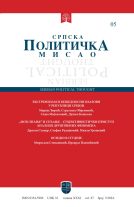- Home page
- Researchers
- Andrijana Lazarevic
Andrijana Lazarevic

PRINCIPLE OF TERRITORIAL INTEGRITY: POLITICAL CONSEQUENCES OF THE SEARCH FOR THE FINAL STATUS OF KOSOVO AND METOHIJA
The paper analyzes the principle of territorial integrity in the context of the dispute over the final status of Kosovo and Metohija. Without taking a position on the legal disputes, the authors provide an overview of the theoretical debate on territorial integrity and define the political consequences for Serbia's territorial integrity since Kosovo's* unilateral declaration of independence in 2008. Despite the constant mention of integrity as inseparable from sovereignty, the paper highlights the political practice in which Serbia's “territorial integrity” has been turned into an appeal to other states to respect the principle of inviolability of borders. Support for Kosovo's independence by leading Western countries conditioned Serbia to engage in a dialogue with temporary and then permanent administrative institutions in Pristina. The paper concludes that territorial integrity has been reduced to a declarative dimension, as the political demand for the protection of the Serbian community's rights in Kosovo and Metohija has obligated Belgrade to make many concessions, including recognizing the sovereign rights of Pristina's institutions.

INTEGRATION VS. SOVEREIGNATION. “OPEN BALKANˮ IN THE FRAMEWORK OF STATUS AND IDENTITY DISPUTES
The paper analyses the “Open Balkanˮ initiative with the intention of establishing, through a critical discourse analysis, the dominant positions of the countries of the Western Balkans regarding this form of regional cooperation. The authors will show that political discourses towards regional integration are, on the one hand, a product of the internal unfinished process of state and nation-building, while on the other hand, they are a direct consequence of open bilateral issues and the absence of a clear perspective of membership in the European Union. The paper proves that the dominant negative discourse on the “Open Balkansˮ initiative equates regional integration with the fear of losing sovereignty both over internal political processes and on the path of European integration.

THE ROLE AND SIGNIFICANCE OF THE NATIONAL ASSEMBLY AND PARLIAMENTARY DIPLOMACY IN THE PROCESS OF EUROPEAN INTEGRATION OF THE REPUBLIC OF SERBIA
Serbia filed for EU membership after the Stabilization and Association Agreement was confirmed by the European Parliament in 2011, and it was granted candidate status on March 1, 2012. The first intergovernmental conference between Serbia and the EU was held in Brussels on January 21, 2014, marking the beginning of accession negotiations at the political level. The process of negotiations for membership in the European Union implies the participation of a large number of institutions of the European Union and the candidate countries. This paper aims to point out the importance and role of the National Assembly of the Republic of Serbia in the process of European integration, with a special focus on the two most important functions in the context of accession: control and legislative. The second part of the paper discusses the work of the Committee on European Integration and the importance it has in the process of membership negotiations. The last part of the paper will be dedicated to reviewing the cooperation between the National Assembly and the European Parliament, but also the importance and opportunities provided by parliamentary diplomacy with special reference to two initiatives, COSAC and COSAP, which are suitable frameworks for promoting Serbia's interests at European and regional level. The authors are of the opinion that, taking into account the current situation of EU enlargement policy, but also the growing importance of not only the European Parliament but also the parliaments of the member states throughout the accession process, parliamentary diplomacy in the EU integration process opens space for political dialogue and consideration of various issues of importance for the process of European integration of the Republic of Serbia.

EDUCATIONAL POLICY OF THE EUROPEAN UNION: STANDARDS AND CHALLENGES OF THE REPUBLIC OF SERBIA’S АCCESSION PROCESS
As a country that has EU membership as its main foreign policy goal, the Republic of Serbia has been conducting negotiations for membership in the Union since 2014. This process involves negotiations that are divided into 35 chapters. The chapter that was first temporarily closed on the same day it was opened is Chapter 26, which deals with education and culture. The subject of this paper will be European education with a focus on the phases of development, goals, standards and instruments of European educational policy. The second part of the paper will be dedicated to a more detailed analysis of the conditions contained in Chapter 26 that Serbia has to meet in order to achieve compliance with the standards proclaimed by the EU. The last part of the paper shows the degree of harmonization of the education system of the Republic of Serbia with EU standards in the mentioned area. The author concludes that it is necessary to review the existing performance at all levels of education and especially to work on improving a greater degree of inclusion and accessibility of all levels of education.

